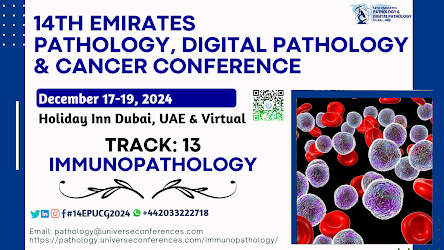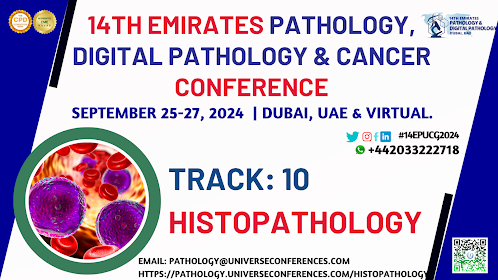Track 13: Immunopathology
SUB TRACK
kidney disease, Graves’ disease, Immunopathology, immunodeficiency diseases, viruses, gene abnormalities, immunological, Rashes, hives, psoriasis, eczema, HPV, cytokines, bacterial, spike in symptoms, Immunology, Cardiac, neurological, Borrelia infection, Lyme disease, multiple sclerosis, tuberculosis, leptospirosis, Whipple disease, sarcoidosis, relapsing fever
Call For Paper/abstract/case study: https://pathology.universeconferences.com/immunopathology/
https://pathology.universeconferences.com/immunopathology/
Immunopathology is a branch of medicine that studies immune responses associated with disease. It includes studies on how the pathology of an organism, a system of organs, or a disease is related to the immune system, immunity, and immunological responses. It is a phrase used in biology to describe damage caused to an organism by the organism’s own immunological response to an infection. It frequently happens when an animal pathogen infects a human and may be caused by a mismatch between the infection and the host species.
immunological diseases
Normally, underlying immune system defects are what cause the illness. In this situation, the immune system is put to the test, resulting in reactions that damage cells and tissues instead of protecting them. All immunodeficiency diseases, which increase the risk of tumours and infections, are brought on by malnutrition, gene abnormalities, and viruses, including HIV.
Immune Dysfunction Symptoms
- Stomach ailments.
- The presence of parasites.
- The spread of candida.
- Allergies and asthma.
- Frequent cases of the flu and cold.
- Autoimmune conditions.
- Aching joints and muscles.
- Herpes outbreak (cold sores).
- HPV and abnormal PAP smears.
- Chronic rhinitis or a runny nose.
- Rashes, hives, psoriasis, or eczema.
Heightened sensitivity
Hypersensitivity reactions are unfavourable immune system-generated responses.
Type I: Instantaneous sensitivity.
Type II: cytotoxic or antibody-dependent hypersensitivity
Type III: Illness with an immunological complex.
Type IV: Sort of delayed sensitivity.
Type I Hypersensitivity is the most prevalent form of hypersensitivity reaction. It is an allergic response brought on by frequent contact with a specific antigen or allergen. Unlike the anticipated immune reaction,
Type II Rare hypersensitivity reactions may not show symptoms for two to twenty-four hours. These kinds of reactions are brought on by complexes that are made when IgG and IgM antibodies bind to the patient’s own cell-surface components. This leads to opsonization and red blood cell agglutination.
Type III Hypersensitivity reactions take place when IgG and IgM antibodies bind to soluble proteins, creating immune complexes that can deposit in tissues as opposed to cell surface molecules as in type II hypersensitivity reactions.
Type IV Antibodies are not necessary for reactions; they are cell-mediated. They occur more frequently than any other type of hypersensitivity reaction, and they typically take two days or longer to develop. These kinds of responses are brought on by overstimulating T cells, monocytes, and macrophages, which release cytokines that cause tissue damage, cell death, and inflammation.
Immunopathology Association American Academy of Allergy, Asthma and Immunology, American Association of Immunologists, American Association of Pharmaceutical Scientists, American Association of Veterinary Immunologists, American College of Allergy, Asthma and
Immunopathology Society Immunology,American Society for Histocompatibility, Immunogenetics Australasian Society for Immunology, Australasian Society of Clinical Immunology , British Society for Allergy and Clinical Immunology, British Society for Histocompatibility and Immunogenetics, British Society for Immunology, Canadian Society for Immunology British Society for Immunology, Norwegian Society of Allergology, Immunopathology Clinical Immunology Society
Important Information:
Conference Name: 14th Emirates Pathology, Digital Pathology & Cancer Conference
Short Name: 14EPUCG2024
Dates: December 17-19, 2024
Venue: Holiday Inn Dubai, UAE & Online
Email: pathology@universeconferences.com
Visit: https://pathology.universeconferences.com/
Submit here: https://pathology.universeconferences.com/submit-abstract/
Register here: https://pathology.universeconferences.com/registration/
Online Registration here: https://pathology.universeconferences.com/virtual-registration/
Call Us: +12073070027
WhatsApp us at https://wa.me/442033222718?text=



.png)
Comments
Post a Comment